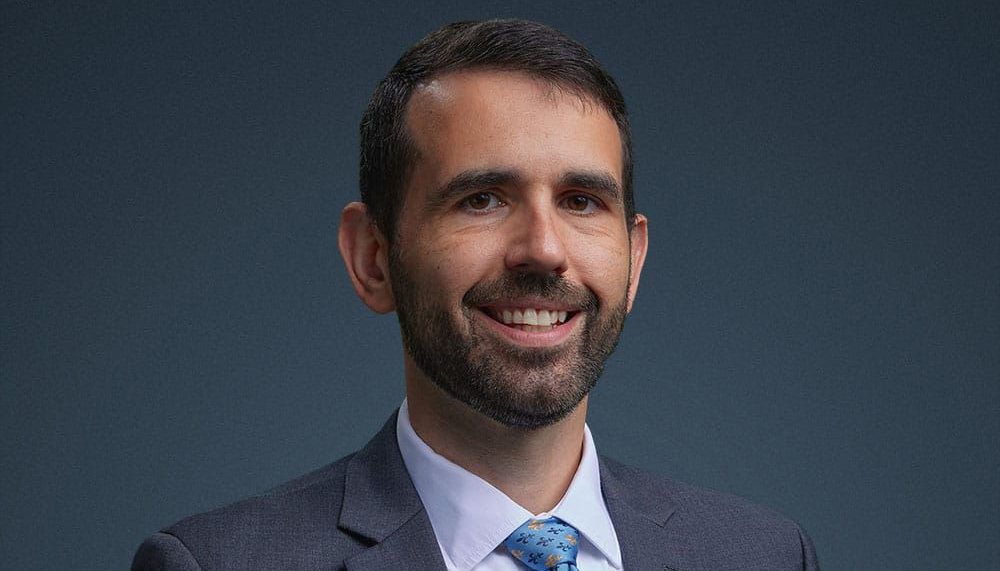Meet Our New Electrophysiologist: Dr. William Perucki

We are thrilled to have Dr. William Perucki join our team this summer. As a fellowship-trained electrophysiologist, he brings an exciting new service area to our practice and specializes in heart rhythms and heart abnormalities. In the interview below, Dr. Perucki answers some questions and shares his background and areas of expertise.
How did you start your career?
I grew up in Connecticut and attended the University of Connecticut. I graduated in 2004 with a BA in Business Administration. I spent six years in the field of finance and accounting, first at Deloitte, and then at United Technologies. It was an interesting career, but something was missing. A conversation with my grandmother made me realize that somehow, I had gotten sidetracked from my initial goal of becoming a physician. At that point, I decided to recommit and pursue my lifelong dream of becoming a physician.
What was medical school like in Poland?
I am very proud of my Polish heritage. I chose to attend medical school at Jagiellonian University Medical College in Krakow, Poland which allowed me to reconnect with my roots. Founded in 1364, it is one of the oldest medical schools in the world and offered me a unique perspective of how medicine is practiced outside the United States. As a single-payer, government funded healthcare system, there is a strict allocation of resources. My physician teachers were outstanding and are some of the smartest people I have ever met. They are creative in their practice, working within the rules of the system while still delivering high quality care. It was an excellent learning experience.
Where did you continue your training?
I graduated in 2014 and returned to Connecticut where I completed my Internal Medicine Residency at the University of Connecticut. I was honored to be chosen by faculty and peers to serve as Chief Resident in 2017. I was pleased to be awarded the Hartford Hospital Team of the Year Rover Award in 2017 and the Hartford Hospital Ambulatory Care Award from 2016-2017.
I completed my cardiology fellowship at Hartford Hospital and was again chosen by the faculty to serve as Chief Fellow in my final year.
What made you pursue electrophysiology?
Electrophysiology is a subset of cardiology and is the study of heart rhythms and heart rhythm abnormalities. It is a fascinating field that involves performing intricate procedures to understand the cause of abnormal heart rhythms known as arrhythmias. I wasn’t originally interested in pursuing further subspecialty training. After I spent some time with an experienced electrophysiologist at Hartford Hospital, he opened my eyes to the intricacies of electrophysiology. I spent time with him performing procedures, learned from him, and was intrigued by the complexities of this subspecialty which combines my love of logic with my love of medicine. I went on to complete an additional two-year fellowship in Clinical Cardiac Electrophysiology at Temple University in Philadelphia, Pennsylvania.
What does an electrophysiologist do?
As an electrophysiologist, I bring a unique set of skills to Consulting Cardiologists. I specialize in diagnosing and treating abnormal heart rhythms. Using non-invasive and minimally invasive/catheter-based techniques, I perform testing of the electrical system of the heart to determine the best treatment, which can be either a medication or a procedure.
What do you like about the field of electrophysiology?
I joke that I am a “low voltage electrician.” Electrophysiology is a puzzle – you know what normal heart rhythms look like, but you need to figure out the intricacies that are leading to abnormal behaviors.
I like the challenge. Nothing is predictable and you must think on your feet during a procedure. When you do an electrophysiology procedure to diagnose the source of the abnormal behavior, you are a detective. At times you find the root of the problem is different than you had originally predicted.
What are the first steps in diagnosing heart rhythm abnormalities?
One of the initial steps I take is to observe. This may involve having the patient wear a monitor at home for 2-4 weeks. Or, for those patients who had a stroke, I may implant a small monitor. I do this right in the office, and it can monitor the heart for 3-4 years to look for abnormal heart rhythms.
Sometimes, I suggest medication as the initial approach to see if that can correct the issue. Medication can be effective in approximately 50-60% of the cases. Other times, we take a wait-and-see approach to determine if the heart abnormalities stabilize over time or require more extensive treatment.
For patients with serious or life-threatening issues, or those that may prefer a more definitive treatment, a procedure may be the optimal approach.
What types of procedures do electrophysiologists perform?
For patients diagnosed with a fast heart rhythm, I can perform a catheter-based radiofrequency ablation to eliminate abnormal heart rhythms. This minimally invasive procedure is done in a hospital setting, using a series of catheters that allow me to identify, target, and eliminate abnormal electrical signals from your heart.
For patients diagnosed with slow rhythms, I may perform a minor surgical procedure to implant a pacemaker to supplement or “rewire” the heart to get it to work the way it should.
For a patient with a weak heart facing the risk of sudden death, I can perform another minor surgical procedure to implant a defibrillator which can monitor the heart’s rhythm 24/7 and if necessary restore a normal rhythm.
I currently perform these procedures at Hartford Hospital and Midstate Hospital. They are done on an outpatient basis and most patients go home the same day.
What types of patients do you see?
Patients will primarily be referred to me by other cardiologists or primary care providers who suspect abnormal heart irregularities. I see patients with heart palpitations, slow heart rhythm, irregular, fast, or erratic heartbeat, or who have passed out for no reason. I see patients in Glastonbury, Wallingford, Avon, and Cheshire.
What is your approach to care?
I think of myself as an advisor. My job is to present options to patients once a diagnosis is made. Together, we look at the treatment choices and it is a shared decision-making process. While many of the minimally-invasive procedures can result in dramatic improvement, this is not always the optimal path and I work with patients to consider all the options.
What made you choose to join Consulting Cardiologists?
Since I trained in Hartford, I had worked with many of the cardiologists on their team and knew their reputation for excellence. Some of them even mentored me during my training. Individually and collectively, they are recognized as the best cardiologists in Connecticut, and I was thrilled to be offered a chance to join this outstanding group.
I like that Consulting Cardiologists is an independent practice, which allows the physician to offer the most advanced, cost-effective, and personalized services. I also like their philosophy of care and how they truly spend time getting to know their patients and providing the highest quality care. I am very happy to add electrophysiology to their comprehensive cardiology offerings.
Anything else to know about you?

I am the proud father of two young children who keep me and my wife on our toes. I am an avid backpacker and have hiked the backcountry of Yellowstone and camped in the Grand Canyon. I have driven cross country several times, visiting 46 states, with the most memorable trip being one to Alaska (over 12,000 miles in 4 weeks)!
Dr. Perucki sees patients in Glastonbury, Wallingford, Avon, and Cheshire. Click here to learn more about his background. To schedule a visit, call (860) 522-0604.